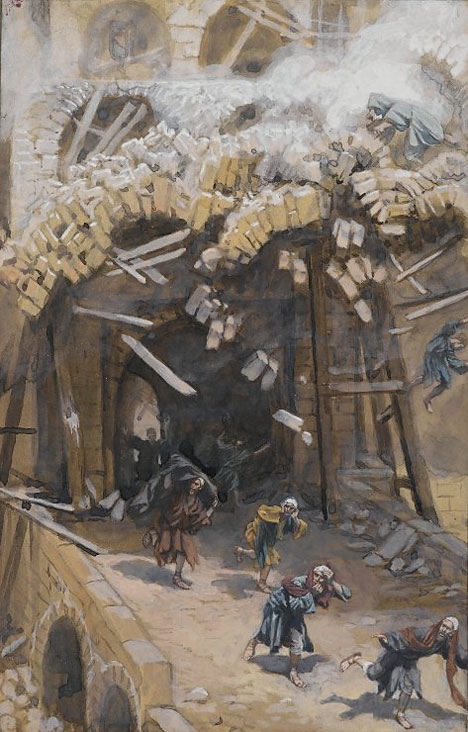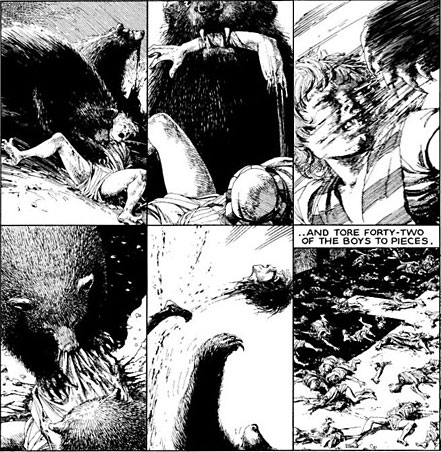Jul
5
2013
 or A Kingdom Mind
or A Kingdom Mind
The best part of the Avengers movie for me was the infighting among the super heroes, and how the conflict disappeared once they had a common enemy. Each hero was unique, with his or her special skills. As in any relationship, marriage, community or committee, the differences are misinterpreted as sources of conflict and competition instead of complementary strengths. Once the heroes were out on the ground, the comical infighting (and misuse of gifts) ceased, and they started operating like the well-tuned orchestra they were designed to be.
Continue reading
2 comments | tags: Baptism, Covenant Theology, Ecclesiology, Music, Peter Leithart | posted in Bible Matrix, Biblical Theology, Christian Life, Quotes
Jul
4
2013

“Perhaps time is what happens when God puts eternity temporarily on hold.”
A Brief History of Time
Sermon Notes | 16 June 2013
Reading: Genesis 8
Introduction
Reality is a trinity of things: matter, space and time. None has any meaning without the other. But together, matter, space and time are the components of life. We are called to be faithful with material things (what we do), and with spatial things (where we go) but we are also called to be faithful with time.
What is Time?
Like life, time is something that cannot be retrieved if it gets wasted or lost. It cannot be relived or recreated.
“And just as it is appointed for man to die once, and after that comes judgment, so Christ, having been offered once to bear the sins of many, will appear a second time, not to deal with sin but to save those who are eagerly waiting for him.” (Hebrews 9:27)
Time is a gift to us from God to carry out things on His behalf. Time is “Covenantal.” But what does this mean? It means that time, like space and matter, is closely linked to mankind as part of his “tour of duty.” Paul calls us to “redeem the time.” What does he mean? He means we are to buy back history for God by using it to do His will. How do you spend your time?
Continue reading
Comments Off | tags: Covenant Theology | posted in Bible Matrix, Biblical Theology
Jun
29
2013

The Falling Architecture of Luke 12:49 – 13:35
An online friend noticed that the tower of Siloam in Luke 13:4 killed eighteen people, and only a few paragraphs later, in 13:11, the bent-over woman had been disabled for eighteen years. Is this a coincidence? Not likely.
Continue reading
Comments Off | tags: Chiasm, Covenant Theology, Literary Structure, Luke, Steve Jeffery | posted in Bible Matrix, Biblical Theology, The Last Days
Jun
26
2013
 “Smooth narrative” is one of the arguments against the inclusion of the final verses of the Gospel of Mark. The Bible isn’t known for its smooth narrative, anyway, but the ending does seem to pick up the speed suddenly. Is there anything in the text that might point in the other direction? How about literary structure?
“Smooth narrative” is one of the arguments against the inclusion of the final verses of the Gospel of Mark. The Bible isn’t known for its smooth narrative, anyway, but the ending does seem to pick up the speed suddenly. Is there anything in the text that might point in the other direction? How about literary structure?
Mark follows a convention found throughout all the Bible’s texts, based upon the Creation Week and the Levitical Feasts (Leviticus 23). The gospel has a number of “Covenant-shaped” cycles, and the entire book is itself “Covenant-shaped.” This final cycle is left incomplete if the gospel ends at 16:8 (see below). The question is, does this “clockwork” internal textual evidence outweigh the shabby history of the manuscripts? Continue reading
Comments Off | tags: Literary Structure, Mark | posted in Bible Matrix, Biblical Theology, Totus Christus
Jun
24
2013

or Who Is The Real Jericho?
Atheists love to embarrass Christians with a snide reference to the story of Elisha setting two bears upon some helpless children. What nobody, even Christians, seem to get is the “Covenant significance” of all the players in the story, harking back to Moses. The prophets were, after all, God’s “repo men.” [1]
[This post has been refined and included in Sweet Counsel: Essays to Brighten the Eyes.]
Continue reading
Comments Off | tags: AD70, Covenant curse, Covenant Theology, Egypt, Elisha, Feasts, Herod, Jericho, Jezebel, Kings, Leviticus, Peter Leithart, Pharaoh, Revelation | posted in Apologetics, Bible Matrix, Biblical Theology, The Last Days
Jun
20
2013
 The intro to the Reading the Bible in 3D seminar mentions the “jokes” in the Bible. In his book Deep Exegesis, Peter Leithart gives us a rundown on what a joke is to justify using the word to describe some of the allusions in Scripture. One of the reasons jokes are funny is their reliance on inside information.
The intro to the Reading the Bible in 3D seminar mentions the “jokes” in the Bible. In his book Deep Exegesis, Peter Leithart gives us a rundown on what a joke is to justify using the word to describe some of the allusions in Scripture. One of the reasons jokes are funny is their reliance on inside information.
Here’s my all-time favourite joke in the Bible.
Continue reading
Comments Off | tags: Covenant Theology, Daniel, Esther, Genesis, James Jordan, Joseph, Mordecai, Peter Leithart, Revelation, Typology | posted in Bible Matrix, Biblical Theology, Reading the Bible in 3D
Jun
4
2013
or Bird’s Eye View
[This post has been refined and included in Sweet Counsel: Essays to Brighten the Eyes.]
Continue reading
2 comments | tags: Genesis, Herod, Noah, Revelation, Systematic typology, Urim and Thummim | posted in Bible Matrix, Biblical Theology, The Last Days
May
28
2013
or Back To Egypt in Ships

“That which they sought to save them from the condemnation of the Law of Moses has also innoculated them against the grace and Spirit of Jesus Christ.”
Pope Francis, in a recent homily, has written,
[This post has been refined and included in Sweet Counsel: Essays to Brighten the Eyes.]
Continue reading
3 comments | tags: Covenant Theology, Luke, Moses, Roman Catholicism, Ten Commandments | posted in Apologetics, Bible Matrix, Biblical Theology, Christian Life
May
23
2013
 Joe Rigney writes,
Joe Rigney writes,
While Jesus clearly did many signs throughout his ministry (2:23; 6:2; 20:30), most scholars agree that there are seven signs that are emphasized in the Gospel of John, but only six are universally identified.
Continue reading
Comments Off | tags: Joe Rigney, John, Literary Structure | posted in Bible Matrix, Biblical Theology
May
15
2013

“He said to him, ‘Bring me a heifer three years old, a female goat three years old, a ram three years old, a turtledove, and a young pigeon.’ And he brought him all these, cut them in half, and laid each half over against the other. But he did not cut the birds in half. And when birds of prey came down on the carcasses, Abram drove them away.” (Genesis 15:9-11)
When Abram asked for a sign concerning the Lord’s promise concerning an heir, the Lord carried it out with animals slain and displayed upon the Land. In the Covenant-literary structure of Genesis 15, the animals were slain and laid out at “Pass-over,” and the Lord’s chariot (as a Head and Body) “passed-through” at Atonement, (matching Pass-over” chiastically) picturing Joshua and Israel entering Canaan. (See Pass-over and Pass-through, and compare the charts on pages 93 and 115 of Bible Matrix.)
What is also interesting is the “architecture” of the sacrifice. We do not know which animals were considered “clean” by the Lord in Noah’s time, but the number of sacrificial animals was now limited to five. They correspond to the architecture of the Tabernacle. If we include Abram in his deep sleep (as a “covering”) and the birds of prey representing the curse of the Law, in the following diagram we have the complete “footprint” of the humaniform house made entirely out of birds and beasts.
Continue reading
Comments Off | tags: Abraham, Circumcision, Genesis, Literary Structure, Tabernacle | posted in Bible Matrix, Biblical Theology
 or A Kingdom Mind
or A Kingdom Mind
































